Unit 13 We're trying to save the earth! SectionA Grammar Focus-4c课件(共18张PPT) 人教版英语九年级全册
文档属性
| 名称 | Unit 13 We're trying to save the earth! SectionA Grammar Focus-4c课件(共18张PPT) 人教版英语九年级全册 | 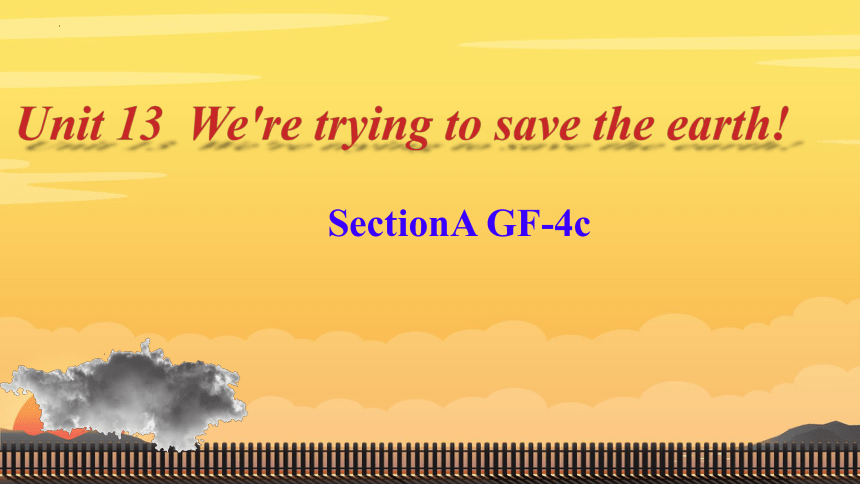 | |
| 格式 | pptx | ||
| 文件大小 | 652.3KB | ||
| 资源类型 | 教案 | ||
| 版本资源 | 人教新目标(Go for it)版 | ||
| 科目 | 英语 | ||
| 更新时间 | 2024-09-23 09:33:21 | ||
图片预览

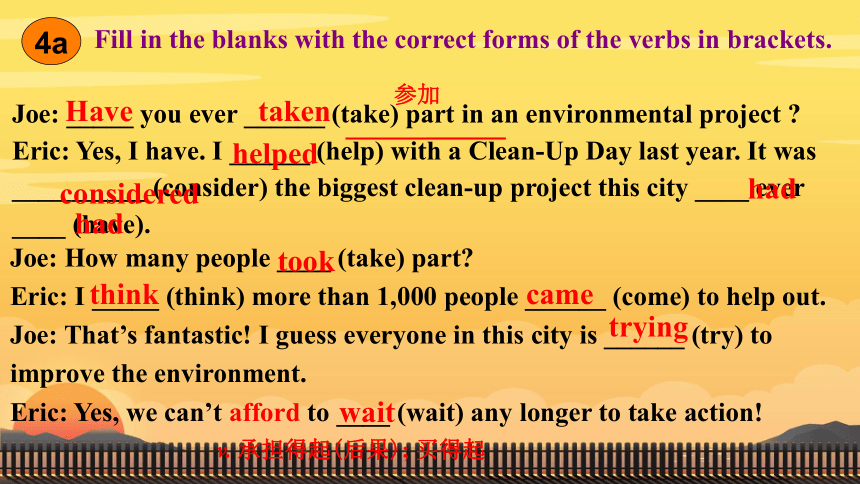
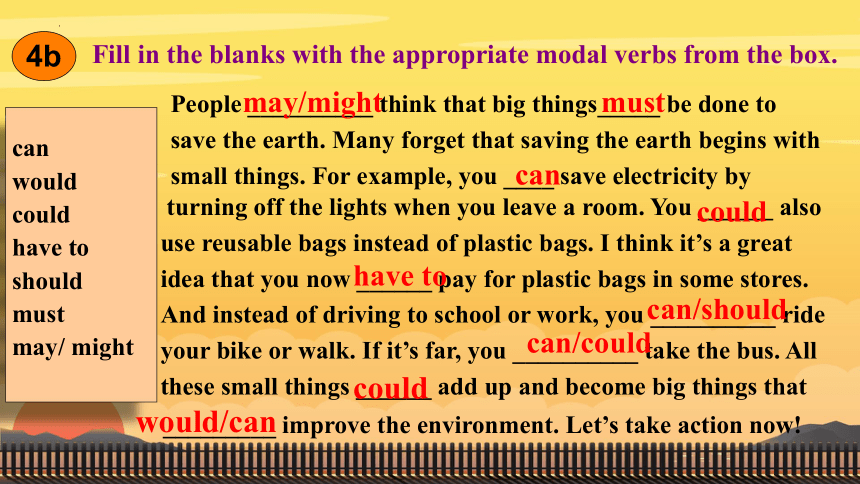
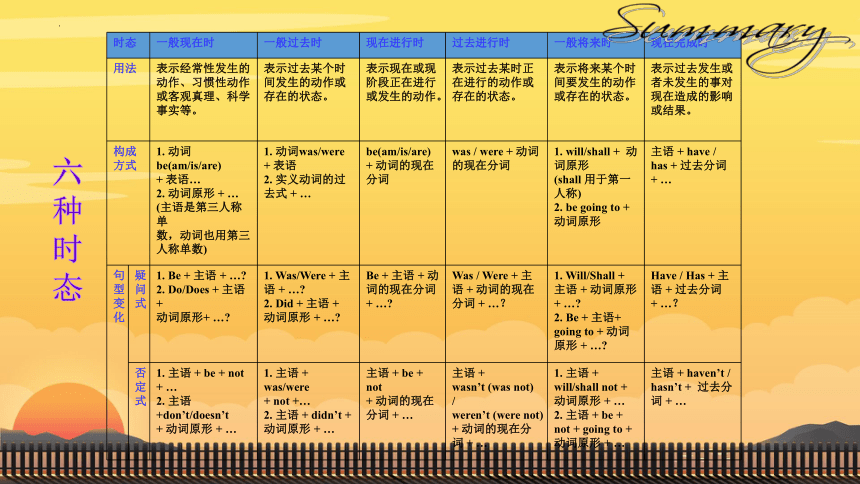
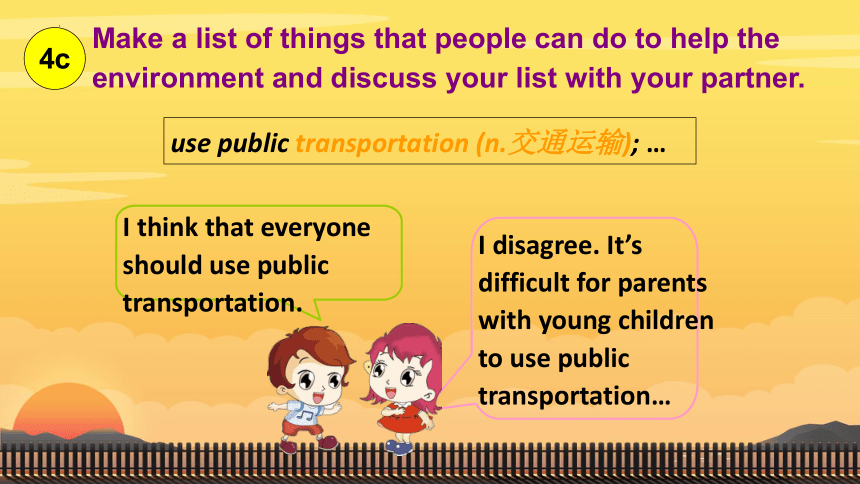
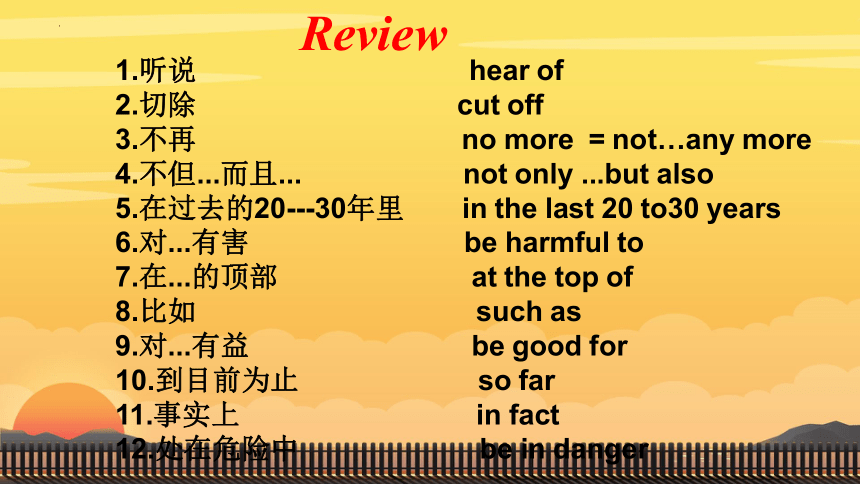
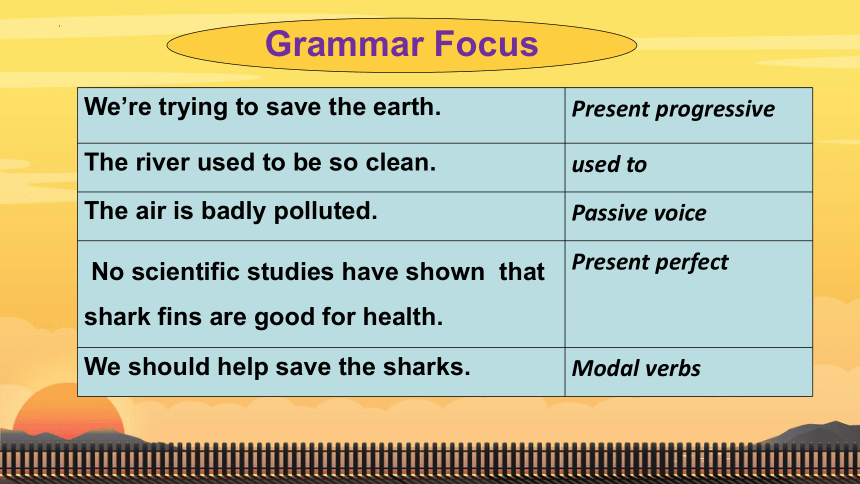
文档简介
(共18张PPT)
Unit 13 We're trying to save the earth!
SectionA GF-4c
4a
Fill in the blanks with the correct forms of the verbs in brackets.
Joe: _____ you ever ______ (take) part in an environmental project
Eric: Yes, I have. I ______ (help) with a Clean-Up Day last year. It was __________ (consider) the biggest clean-up project this city ____ ever ____ (have).
Have
taken
helped
considered
had
had
参加
Joe: How many people ____ (take) part
Eric: I _____ (think) more than 1,000 people ______ (come) to help out.
Joe: That’s fantastic! I guess everyone in this city is ______ (try) to improve the environment.
Eric: Yes, we can’t afford to ____ (wait) any longer to take action!
took
think
came
trying
wait
v. 承担得起(后果); 买得起
4b
Fill in the blanks with the appropriate modal verbs from the box.
People __________ think that big things_____ be done to save the earth. Many forget that saving the earth begins with small things. For example, you ____ save electricity by
may/might
must
can
can
would
could
have to
should
must
may/ might
turning off the lights when you leave a room. You ______ also use reusable bags instead of plastic bags. I think it’s a great idea that you now ______ pay for plastic bags in some stores. And instead of driving to school or work, you __________ ride your bike or walk. If it’s far, you __________ take the bus. All these small things ______ add up and become big things that
could
have to
can/should
can/could
_________ improve the environment. Let’s take action now!
could
would/can
六
种
时
态
时态 一般现在时 一般过去时 现在进行时 过去进行时 一般将来时 现在完成时
用法 表示经常性发生的动作、习惯性动作或客观真理、科学事实等。 表示过去某个时间发生的动作或存在的状态。 表示现在或现阶段正在进行或发生的动作。 表示过去某时正在进行的动作或存在的状态。 表示将来某个时间要发生的动作或存在的状态。 表示过去发生或者未发生的事对现在造成的影响或结果。
构成 方式 1. 动词be(am/is/are) + 表语… 2. 动词原形 + … (主语是第三人称单 数,动词也用第三人称单数) 1. 动词was/were + 表语 2. 实义动词的过 去式 + … be(am/is/are) + 动词的现在分词 was / were + 动词的现在分词 1. will/shall + 动词原形 (shall 用于第一人称) 2. be going to + 动词原形 主语 + have / has + 过去分词 + …
句 型 变 化 疑 问 式 1. Be + 主语 + … 2. Do/Does + 主语 + 动词原形+ … 1. Was/Were + 主 语 + … 2. Did + 主语 + 动词原形 + … Be + 主语 + 动词的现在分词 + … Was / Were + 主语 + 动词的现在分词 + …? 1. Will/Shall + 主语 + 动词原形+ … 2. Be + 主语+ going to + 动词原形 + … Have / Has + 主语 + 过去分词 + …?
否 定 式 1. 主语 + be + not + … 2. 主语+don’t/doesn’t + 动词原形 + … 1. 主语 + was/were + not +… 2. 主语 + didn’t + 动词原形 + … 主语 + be + not + 动词的现在分词 + … 主语 + wasn’t (was not) / weren’t (were not) + 动词的现在分词 + … 1. 主语 + will/shall not + 动词原形 + … 2. 主语 + be + not + going to + 动词原形 + … 主语 + haven’t / hasn’t + 过去分词 + …
4c
Make a list of things that people can do to help the environment and discuss your list with your partner.
use public transportation (n.交通运输); …
I think that everyone should use public transportation.
I disagree. It’s difficult for parents with young children to use public transportation…
1.听说 hear of
2.切除 cut off
3.不再 no more = not…any more
4.不但...而且... not only ...but also
5.在过去的20---30年里 in the last 20 to30 years
6.对...有害 be harmful to
7.在...的顶部 at the top of
8.比如 such as
9.对...有益 be good for
10.到目前为止 so far
11.事实上 in fact
12.处在危险中 be in danger
Review
Grammar Focus
We’re trying to save the earth. Present progressive
The river used to be so clean. used to
The air is badly polluted. Passive voice
No scientific studies have shown that shark fins are good for health. Present perfect
We should help save the sharks. Modal verbs
现在进行时: Present Progressive
结构: be (am/is/are) + v.-ing
标志词:Look, Listen, now, right now…
e.g. Look! The boy is crying.
定义:表示说话时(瞬间)正在进行的动作, 也表示目前或现阶段正在进行的动作。
What a fine day today!
Look! What are they doing
用括号内所给动词的适当形式填空。
Listen! The phone __________(ring).
Please go to answer it.
— Alan, it’s late. Why not go to bed
— Jenny hasn’t come back yet.
I ___________(wait) for her.
3. — What’s your father doing now
— He __________ (write) a letter in the study.
is ringing
am waiting
is writing
被动语态:Passive voice
定义:表示主语是动作的承受者,即为动作的对象的一种语态。
结构:be + 过去分词
e.g. A new school was built last year.
Our classroom is cleaned every day.
Translate the sentences by using Passive voice.
1. 刚才一些老年人参观了博物馆。
2. 工人们使用不同种类的机器工作。
The museum was visited by some old people just now.
Different kinds of machines are used to work by the workers.
The first section of New College English is designed for speaking practice and is based on pictures and topics.
These computers were made in our own country last year.
Shall we be asked to attend the opening ceremony
①一般现在时的被动语态:am/is/are + V-ed
②一般过去时的被动语态:was/were+ V-ed
③一般将来时的被动语态:will/shall+be+ V-ed
时态 主动语态 被动语态
一般现在时 do / does am / is / are + done
一般过去时 did was / were + done
一般将来时 will / be going to + do will / be going to + be + done
一般现在时、一般过去时和一般将来时的主动结构和被动结构
(以动词do为例):
结构: has/have + 过去分词
标志词:already, yet, ever, never, since,
for…
e.g. I haven’t finished my homework yet.
定义:表示动作已经完成, 但对现在造成影响; 或者表示从过去某一时间开始一直延续到现在并还可能持续下去的动作。
现在完成时: Present Perfect
Complete the following sentences.
1. I _________ (be) in Beijing for two years.
2. I _____ never _____ (hear) of that man before.
3. Tom __________ (work) there since two years ago.
have been
have
heard
has worked
4. The twins ___________ (wash) the clothes for an hour.
5. He _________ (play) basketball since three years ago.
6. How long ____ Sally _____ (sing) yet
have washed
has played
has
sung
1. 情态动词本身有一定的词义, 表示说话人的情绪、态度或语气, 但不能单独作谓语, 只能与其他动词构成谓语。常见的有: can (could), may (might), must, need, shall (should), will (would)等。
情态动词
4
2. 情态动词无人称和数的变化, 后接动词原形。否定式是在情态动词后面加not。个别情态动词有过去式形式, 可用来表达更加客气、委婉的语气。
e.g. Ken can climb up the tress like a koala.
Tracy could ride a bicycle when she was five years old.
You mustn’t play with fire. It is dangerous.
Translation.
1. 我们不能在教室里吃东西。
2. 首先你必须完成作业。
3. 他现在不可能在家。
4. 她一定知道这个问题的答案。
We can’t eat in the classroom.
You must finish your homework first.
He can’t be at home now.
She must know the answer to this question.
used to do sth. 表示过去常常做某事, 而现在往往不做了, 后接动词原形。
be used to doing sth. 表示习惯于做某事
e.g. I used to get up at six o’clock.
Joe is used to drinking a cup of coffee every morning.
used to do与be used to doing
Unit 13 We're trying to save the earth!
SectionA GF-4c
4a
Fill in the blanks with the correct forms of the verbs in brackets.
Joe: _____ you ever ______ (take) part in an environmental project
Eric: Yes, I have. I ______ (help) with a Clean-Up Day last year. It was __________ (consider) the biggest clean-up project this city ____ ever ____ (have).
Have
taken
helped
considered
had
had
参加
Joe: How many people ____ (take) part
Eric: I _____ (think) more than 1,000 people ______ (come) to help out.
Joe: That’s fantastic! I guess everyone in this city is ______ (try) to improve the environment.
Eric: Yes, we can’t afford to ____ (wait) any longer to take action!
took
think
came
trying
wait
v. 承担得起(后果); 买得起
4b
Fill in the blanks with the appropriate modal verbs from the box.
People __________ think that big things_____ be done to save the earth. Many forget that saving the earth begins with small things. For example, you ____ save electricity by
may/might
must
can
can
would
could
have to
should
must
may/ might
turning off the lights when you leave a room. You ______ also use reusable bags instead of plastic bags. I think it’s a great idea that you now ______ pay for plastic bags in some stores. And instead of driving to school or work, you __________ ride your bike or walk. If it’s far, you __________ take the bus. All these small things ______ add up and become big things that
could
have to
can/should
can/could
_________ improve the environment. Let’s take action now!
could
would/can
六
种
时
态
时态 一般现在时 一般过去时 现在进行时 过去进行时 一般将来时 现在完成时
用法 表示经常性发生的动作、习惯性动作或客观真理、科学事实等。 表示过去某个时间发生的动作或存在的状态。 表示现在或现阶段正在进行或发生的动作。 表示过去某时正在进行的动作或存在的状态。 表示将来某个时间要发生的动作或存在的状态。 表示过去发生或者未发生的事对现在造成的影响或结果。
构成 方式 1. 动词be(am/is/are) + 表语… 2. 动词原形 + … (主语是第三人称单 数,动词也用第三人称单数) 1. 动词was/were + 表语 2. 实义动词的过 去式 + … be(am/is/are) + 动词的现在分词 was / were + 动词的现在分词 1. will/shall + 动词原形 (shall 用于第一人称) 2. be going to + 动词原形 主语 + have / has + 过去分词 + …
句 型 变 化 疑 问 式 1. Be + 主语 + … 2. Do/Does + 主语 + 动词原形+ … 1. Was/Were + 主 语 + … 2. Did + 主语 + 动词原形 + … Be + 主语 + 动词的现在分词 + … Was / Were + 主语 + 动词的现在分词 + …? 1. Will/Shall + 主语 + 动词原形+ … 2. Be + 主语+ going to + 动词原形 + … Have / Has + 主语 + 过去分词 + …?
否 定 式 1. 主语 + be + not + … 2. 主语+don’t/doesn’t + 动词原形 + … 1. 主语 + was/were + not +… 2. 主语 + didn’t + 动词原形 + … 主语 + be + not + 动词的现在分词 + … 主语 + wasn’t (was not) / weren’t (were not) + 动词的现在分词 + … 1. 主语 + will/shall not + 动词原形 + … 2. 主语 + be + not + going to + 动词原形 + … 主语 + haven’t / hasn’t + 过去分词 + …
4c
Make a list of things that people can do to help the environment and discuss your list with your partner.
use public transportation (n.交通运输); …
I think that everyone should use public transportation.
I disagree. It’s difficult for parents with young children to use public transportation…
1.听说 hear of
2.切除 cut off
3.不再 no more = not…any more
4.不但...而且... not only ...but also
5.在过去的20---30年里 in the last 20 to30 years
6.对...有害 be harmful to
7.在...的顶部 at the top of
8.比如 such as
9.对...有益 be good for
10.到目前为止 so far
11.事实上 in fact
12.处在危险中 be in danger
Review
Grammar Focus
We’re trying to save the earth. Present progressive
The river used to be so clean. used to
The air is badly polluted. Passive voice
No scientific studies have shown that shark fins are good for health. Present perfect
We should help save the sharks. Modal verbs
现在进行时: Present Progressive
结构: be (am/is/are) + v.-ing
标志词:Look, Listen, now, right now…
e.g. Look! The boy is crying.
定义:表示说话时(瞬间)正在进行的动作, 也表示目前或现阶段正在进行的动作。
What a fine day today!
Look! What are they doing
用括号内所给动词的适当形式填空。
Listen! The phone __________(ring).
Please go to answer it.
— Alan, it’s late. Why not go to bed
— Jenny hasn’t come back yet.
I ___________(wait) for her.
3. — What’s your father doing now
— He __________ (write) a letter in the study.
is ringing
am waiting
is writing
被动语态:Passive voice
定义:表示主语是动作的承受者,即为动作的对象的一种语态。
结构:be + 过去分词
e.g. A new school was built last year.
Our classroom is cleaned every day.
Translate the sentences by using Passive voice.
1. 刚才一些老年人参观了博物馆。
2. 工人们使用不同种类的机器工作。
The museum was visited by some old people just now.
Different kinds of machines are used to work by the workers.
The first section of New College English is designed for speaking practice and is based on pictures and topics.
These computers were made in our own country last year.
Shall we be asked to attend the opening ceremony
①一般现在时的被动语态:am/is/are + V-ed
②一般过去时的被动语态:was/were+ V-ed
③一般将来时的被动语态:will/shall+be+ V-ed
时态 主动语态 被动语态
一般现在时 do / does am / is / are + done
一般过去时 did was / were + done
一般将来时 will / be going to + do will / be going to + be + done
一般现在时、一般过去时和一般将来时的主动结构和被动结构
(以动词do为例):
结构: has/have + 过去分词
标志词:already, yet, ever, never, since,
for…
e.g. I haven’t finished my homework yet.
定义:表示动作已经完成, 但对现在造成影响; 或者表示从过去某一时间开始一直延续到现在并还可能持续下去的动作。
现在完成时: Present Perfect
Complete the following sentences.
1. I _________ (be) in Beijing for two years.
2. I _____ never _____ (hear) of that man before.
3. Tom __________ (work) there since two years ago.
have been
have
heard
has worked
4. The twins ___________ (wash) the clothes for an hour.
5. He _________ (play) basketball since three years ago.
6. How long ____ Sally _____ (sing) yet
have washed
has played
has
sung
1. 情态动词本身有一定的词义, 表示说话人的情绪、态度或语气, 但不能单独作谓语, 只能与其他动词构成谓语。常见的有: can (could), may (might), must, need, shall (should), will (would)等。
情态动词
4
2. 情态动词无人称和数的变化, 后接动词原形。否定式是在情态动词后面加not。个别情态动词有过去式形式, 可用来表达更加客气、委婉的语气。
e.g. Ken can climb up the tress like a koala.
Tracy could ride a bicycle when she was five years old.
You mustn’t play with fire. It is dangerous.
Translation.
1. 我们不能在教室里吃东西。
2. 首先你必须完成作业。
3. 他现在不可能在家。
4. 她一定知道这个问题的答案。
We can’t eat in the classroom.
You must finish your homework first.
He can’t be at home now.
She must know the answer to this question.
used to do sth. 表示过去常常做某事, 而现在往往不做了, 后接动词原形。
be used to doing sth. 表示习惯于做某事
e.g. I used to get up at six o’clock.
Joe is used to drinking a cup of coffee every morning.
used to do与be used to doing
同课章节目录
- Unit 1 How can we become good learners.
- Section A
- Section B
- Unit 2 I think that mooncakes are delicious!
- Section A
- Section B
- Unit 3 Could you please tell me where the restroom
- Section A
- Section B
- Unit 4 I used to be afraid of the dark.
- Section A
- Section B
- Unit 5 What are the shirts made of?
- Section A
- Section B
- Review of Units 1-5
- Unit 6 When was it invented?
- Section A
- Section B
- Unit 7 Teenagers should be allowed to choose their
- Section A
- Section B
- Unit 8 It must belong to Carla.
- Section A
- Section B
- Unit 9 I like music that I can dance to.
- Section A
- Section B
- Unit 10 You're supposed to shake hands.
- Section A
- Section B
- Review of Units 6-10
- Unit 11 Sad movies make me cry.
- Section A
- Section B
- Unit 12 Life is full of the unexpected
- Section A
- Section B
- Unit 13 We're trying to save the earth!
- Section A
- Section B
- Unit 14 I remember meeting all of you in Grade 7.
- Section A
- Section B
- Review of Units 11-14
